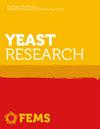Enhancing xylose fermentation capacity of engineered Saccharomyces cerevisiae by multi-step evolutionary engineering in inhibitor-rich lignocellulose hydrolysate
IF 2.4
4区 生物学
Q3 BIOTECHNOLOGY & APPLIED MICROBIOLOGY
引用次数: 0
Abstract
Major progress in developing Saccharomyces cerevisiae strains that utilize the pentose sugar xylose has been achieved. However, the high inhibitor content of lignocellulose hydrolysates still hinders efficient xylose fermentation, which remains a major obstacle for commercially viable second-generation bioethanol production. Further improvement of xylose utilization in inhibitor-rich lignocellulose hydrolysates remains highly challenging. In this work, we have developed a robust industrial S. cerevisiae strain able to efficiently ferment xylose in concentrated undetoxified lignocellulose hydrolysates. This was accomplished with novel multi-step evolutionary engineering. First, a tetraploid strain was generated and evolved in xylose-enriched pretreated spruce biomass. The best evolved strain was sporulated to obtain a genetically diverse diploid population. The diploid strains were then screened in industrially relevant conditions. The best performing strain, MDS130, showed superior fermentation performance in three different lignocellulose hydrolysates. In concentrated corncob hydrolysate, with initial cell density of 1 g DW/L, at 35°C, MDS130 completely co-consumed glucose and xylose, producing ± 7% v/v ethanol with a yield of 91% of the maximum theoretical value and an overall productivity of 1.22 g/L/h. MDS130 has been developed from previous industrial yeast strains without applying external mutagenesis, minimizing the risk of negative side-effects on other commercially important properties and maximizing its potential for industrial application.在富含抑制剂的木质纤维素水解物中,通过多步进化工程提高工程酿酒酵母的木糖发酵能力
在开发可利用戊糖木糖的酿酒酵母菌株方面取得了重大进展。然而,木质纤维素水解物中的高抑制剂含量仍然阻碍着木糖的高效发酵,这仍然是商业上可行的第二代生物乙醇生产的主要障碍。进一步提高木糖在富含抑制剂的木质纤维素水解物中的利用率仍然极具挑战性。在这项工作中,我们开发出了一种强健的工业 S. cerevisiae 菌株,能够在浓缩的未解毒木质纤维素水解物中高效发酵木糖。这是通过新颖的多步骤进化工程实现的。首先,生成四倍体菌株,并在富含木糖的预处理云杉生物质中进行进化。对进化出的最佳菌株进行孢子培养,以获得基因多样化的二倍体群体。然后在工业相关条件下对二倍体菌株进行筛选。表现最好的菌株 MDS130 在三种不同的木质纤维素水解物中都表现出卓越的发酵性能。在浓缩玉米芯水解物中,初始细胞密度为 1 g DW/L,在 35°C 温度下,MDS130 完全共消耗葡萄糖和木糖,产生 ± 7% v/v 的乙醇,产量为最大理论值的 91%,总生产率为 1.22 g/L/h。MDS130 是在以前的工业酵母菌株基础上开发出来的,没有进行外部诱变,从而最大限度地降低了对其他重要商业特性产生负面副作用的风险,并最大限度地提高了其工业应用潜力。
本文章由计算机程序翻译,如有差异,请以英文原文为准。
求助全文
约1分钟内获得全文
求助全文
来源期刊

FEMS yeast research
生物-生物工程与应用微生物
CiteScore
5.70
自引率
6.20%
发文量
54
审稿时长
1 months
期刊介绍:
FEMS Yeast Research offers efficient publication of high-quality original Research Articles, Mini-reviews, Letters to the Editor, Perspectives and Commentaries that express current opinions. The journal will select for publication only those manuscripts deemed to be of major relevance to the field and generally will not consider articles that are largely descriptive without insights on underlying mechanism or biology. Submissions on any yeast species are welcome provided they report results within the scope outlined below and are of significance to the yeast field.
 求助内容:
求助内容: 应助结果提醒方式:
应助结果提醒方式:


